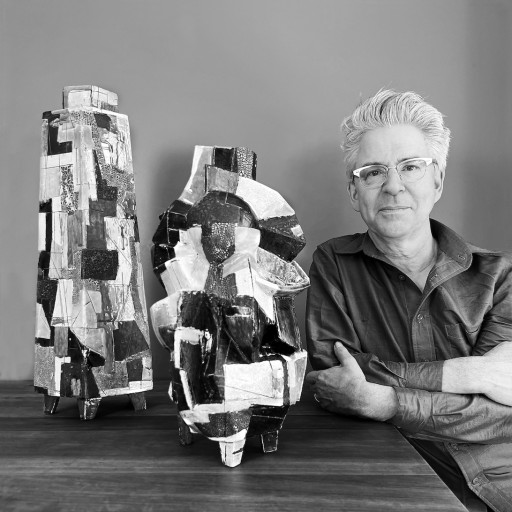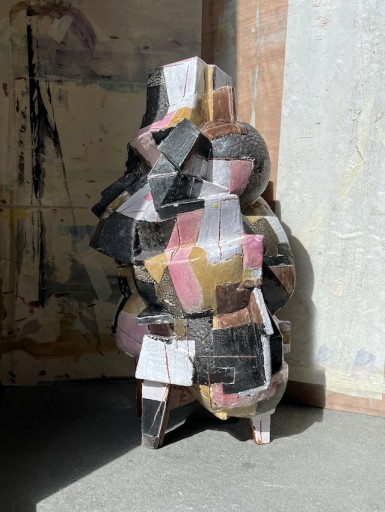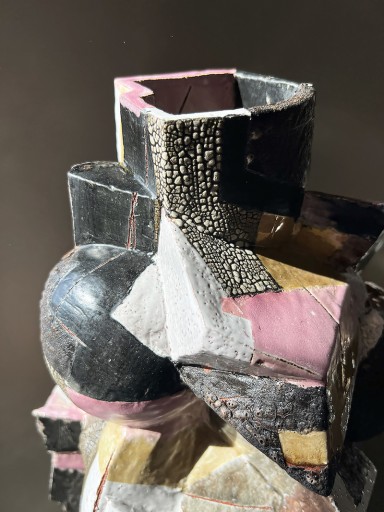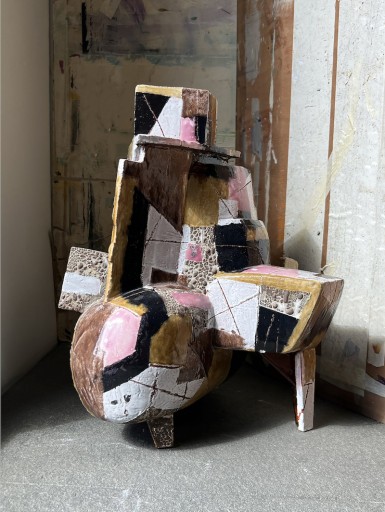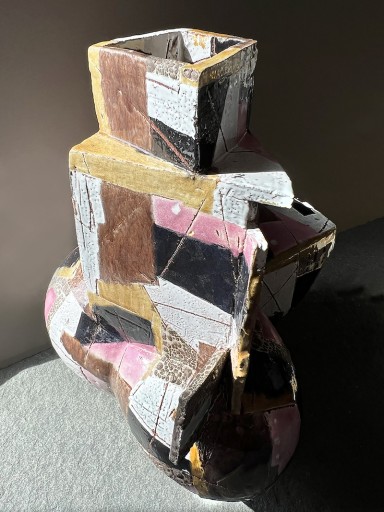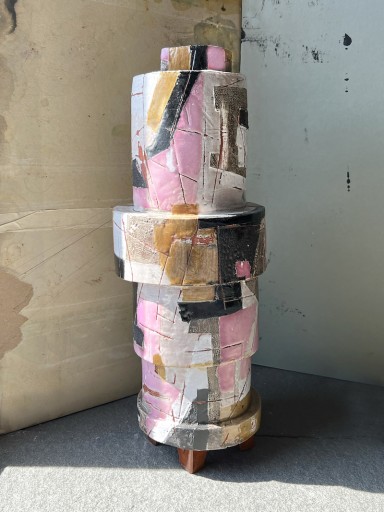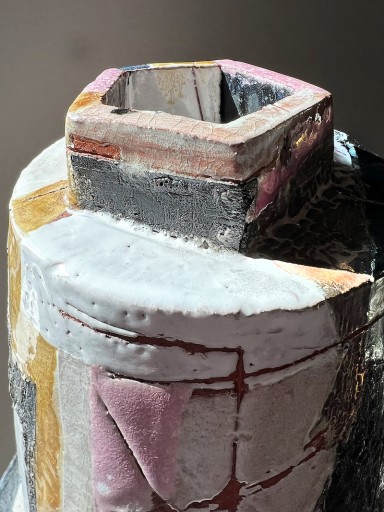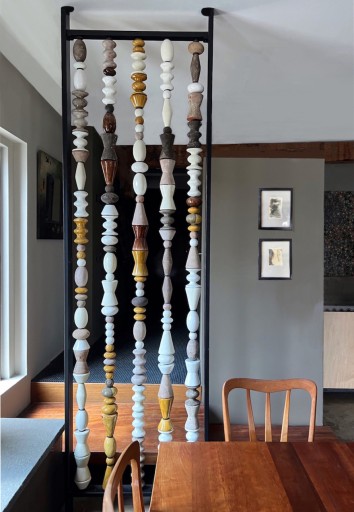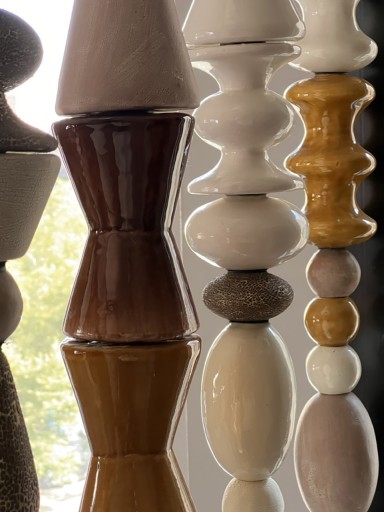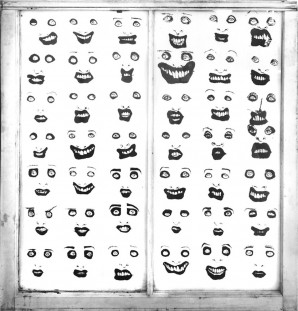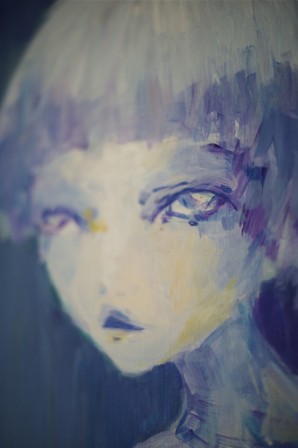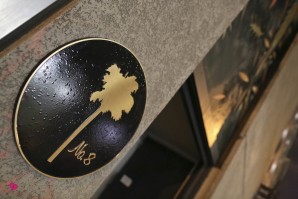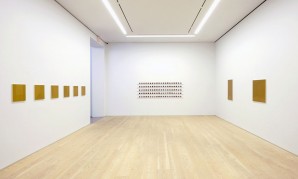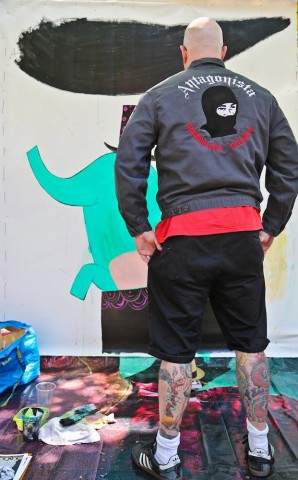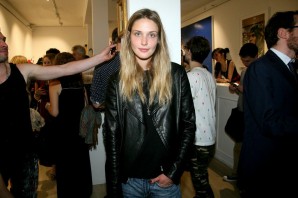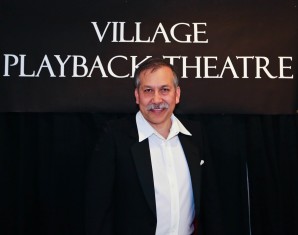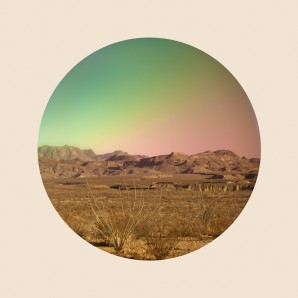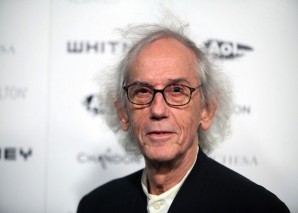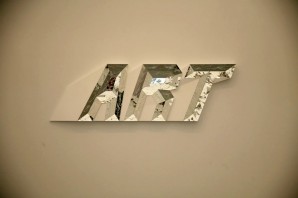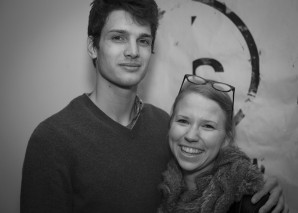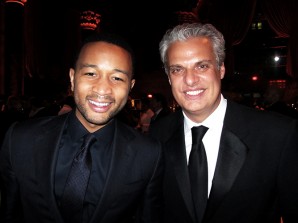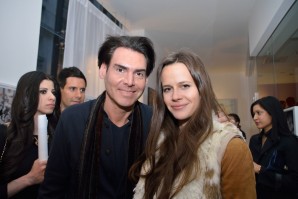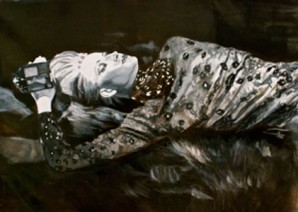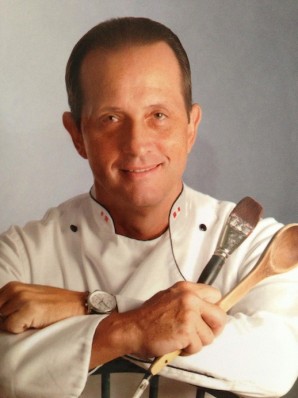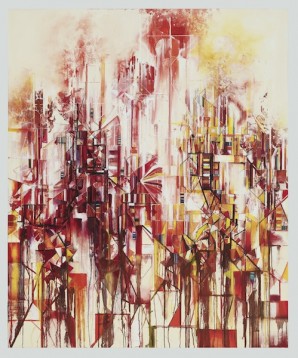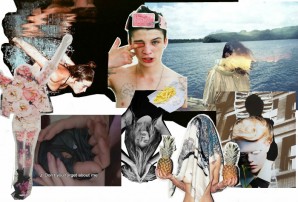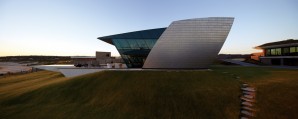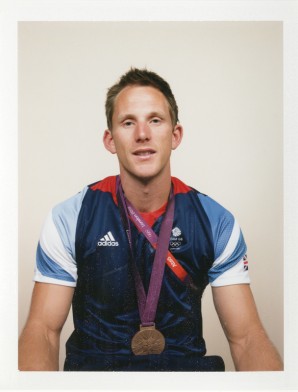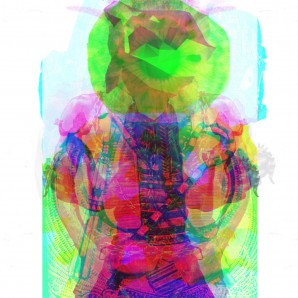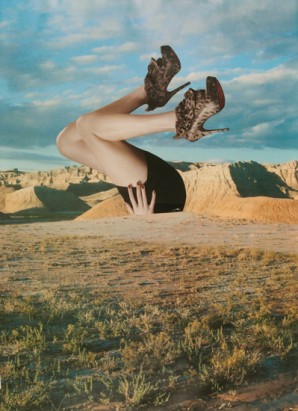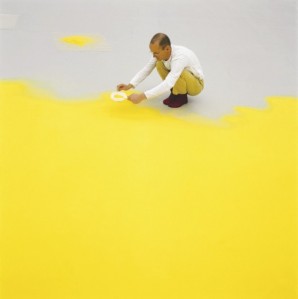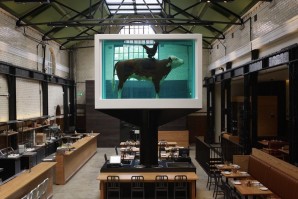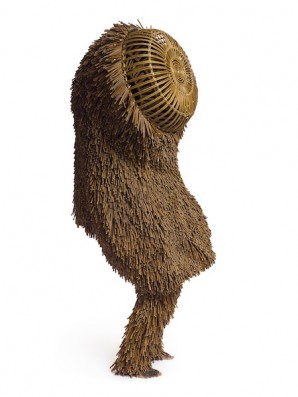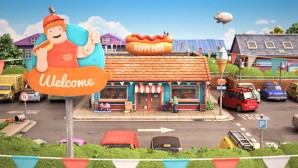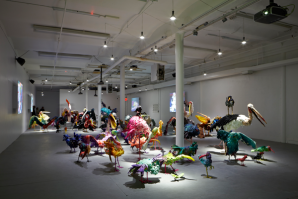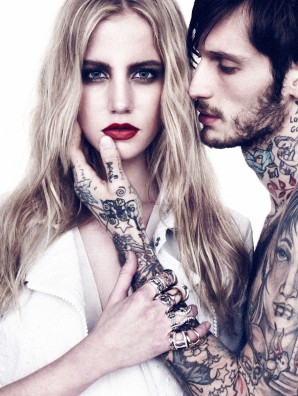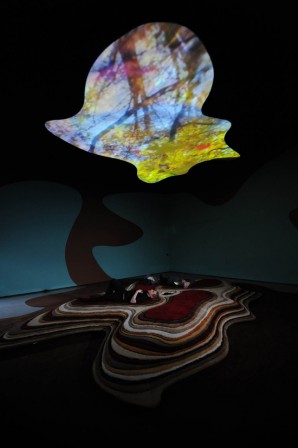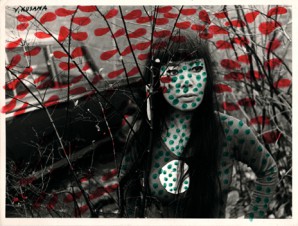PERCEIVING THE UNKNOWN: THE BLACK SOFT INTRODUCES BELOW 14TH STREET
Christopher Russell Interview: Beneath the essence of clay
Christopher Russell spent his youth in a small town outside Boston, Massachusetts. According to his kindergarten report card, he had an “unusual talent for art”. The son of an architect who designed his family’s houses, Russell was lucky to grow up surrounded by beauty. A voracious reader, art history explorer, and savvy artist, Russell thinks of food as another creative inspiration inherited from his family, an 'art form' he has passed on to his son too.
A painter and draughtsman who explores mixed media, fabrics, and texture, following an early awareness of his desire for creation and an artistic environment, Russell, who now works primarily in ceramics, began his work with clay at the historic Greenwich House Pottery in NYC– discovering his love for clay after attending Wesleyan University in Connecticut and moving to New York City in 1985.
Having worked in ceramics for over 30 years, Russell has worked in many forms, from producing custom tiles, vessels, lamps, and screens to developing a ceramic wall piece for the NYU Langone Hospital. As a commission, he produced, a highly lifelike, virtuoso piece that can now be admired by the many people who walk and 'blossom' by the 9th Avenue subway in Sunset Park, NYC. The bronze sculpture was born from his seeing with awe photographs of bees working in their hives.
A resident of New York City and represented by Todd Merrill Studio, the artist found inspiration from Bernard Pallisy, Henry Mercer, Bernard Leach, Alexandre Bigot, and 'the Martin Brothers', whom he discovered with his wife, who initially introduced him to the earthy material that would elucidate his work, clay.
Could you tell us more about your story and how you got to where you are now?
I’ve always been an artist. It's how I see the world, how I digest it. I came across my kindergarten report card. It said, “He mixes up ‘b’ and ‘d’ when he writes, but he has unusual talent in art.” Things haven’t changed much! [While] on a family vacation on a small island off Florida, [with] everyone playing tennis, golfing or swimming, I was looking at the palm trees and thinking, “You could really make a lot of baskets here.”
What sparked your interest in ceramics?
Early on, I thought of myself as a painter/draughtsman. Then my wife took a class in ceramics. She brought some clay home. I grabbed it and was immediately hooked. At first, I made vessels and tiles that were surfaces to draw and paint on, but more and more, I got into the clay, into ‘the building,’ and developed glazes. After a long stretch of working figuratively, I’m back to very painterly vessels. For me, painting on ceramics is different from working in two dimensions. Inside/outside, the multiple, revolving view of the object, the materiality of the clay, and the glaze. Just describing it is so much more interesting than describing a painting!
Are you self-taught?
I didn’t attend art school or have any formal training in ceramics. Some very generous ceramicist friends who I met when I started put up with my constant questions about the basics, like how to fire a kiln or how to mix a glaze. I read a lot. I looked at ceramics, especially historical work. Once my wife and I were in Paris, we started looking for pieces by Bernard Pallisy. He worked in Paris about 500 years ago, and not much of his work is still around. We became obsessed with hunting it down, running around the world, like in the Da Vinci Code.
I learned much from Pallisy and many other artists who left their work for us— Mercer, Leach, Bigot, and the Martin Brothers. And all the anonymous ones— medieval tilemakers, Japanese potters, Indigenous artists...
How would you define the style of your work and its development along your career?
Some artists work with an idea for their whole career, exploring it and finding every nuance. I admire that kind of thoroughness. Rothko did, and Louise Nevelson did. I don’t have a “style” like that. Over my 30 years with clay, I have produced very different bodies of work. I spent 15 years doing detailed, laborious, naturalistic work with many flora and fauna. Then, at one point, I was done. I started making these painterly pieces, the beginning of the work I’ve been doing for the past six years. One day I just started. They came out fully grown, like out of Athena’s head. They had been in my head! And I haven’t made a flower petal since.
What was creativity like for you while growing up?
I was very privileged to grow up with a lot of beauty around me. I grew up in New England, in a town outside of Boston. We spent summers on Cape Cod. My father was an architect. He designed both of our houses. They were beautiful mid-century modern, with big windows, open plan, wood, and stone. Food was —and still is— a big thing. Food as an event, something creative. I was very lucky to have that around me. It was very important to me to pass it on to my son. From very early, it was his job to arrange the dessert plate. At one point, I brought him to the studio to make the dessert plate itself! And now he carries on the tradition in his home.
Your experience and study of art history seem to be an important source of inspiration for you.
I discovered art history in college. I clearly remember a professor putting up a slide of Hagia Sophia and asking for comments about it. Then he specifically picked me to respond. I had no idea what to say; I simply couldn’t imagine what I was supposed to talk about! I had always liked things but knew nothing about ‘tradition.’ Since then, that tradition, the artists, and their work have become a great source of inspiration for me. I don’t know why but during the lockdown (Covid19), I got into Dada, Cubism, and the Bauhaus. That early modern period.
I read a bunch of books. The Museum of Modern Art allowed very limited visitors. I found myself alone in the rooms of Picasso, Braque, and Picabia. The work I’m doing is obviously inspired by those artists and the period when they were working. It’s my response to it.
How do you start a new project?
Reading is a big part of my life and my art process. One book was Dada’s story, which began in Zurich. I began to build a version of the city in my head, jagged, dark, chaotic, and expressionist. My Zurich Collection is my translation of that energy into ceramic. So, all the basics came together in my head, and by the time I had mulched them, I was ready to make the pieces! Of course, they develop from there, but when I start with the clay, I can first see the pieces in my mind.
What part of the processes do you enjoy the most?
I like doing the work. I’m jealous of artists with beautiful sketchbooks full of ideas and preliminary drawings. I do very little design on paper or tablet before I start a piece. I work out the details of the forms as I build, and the glazing is very instinctual. Each piece springs from the last one. The job has endless parts, from sweeping the studio, photographing, and collecting receipts, and pleasurable ones, like museum visits and being mentally involved in new, creative ideas. But it happens at the work table when I think of what I do.
What advice would you give ceramicists starting out in their careers?
Make things out of clay, and then make more things out of clay. Keep going. You have to like it. Ceramics is a pretty masochistic process. Think about it: you work very hard on a piece of artwork, and then, instead of it being done, you put it in a box and heat it to a very high temperature. Eventually, it cools down, and you open the box, and who knows what’s inside? It’s not very sensical. So yes, take the best photographs, send them to people, show your work, and learn all that. But most importantly, go to the studio, put your headset on, and make things out of clay. Oh, and make things twice as big as you think they should be. I notice that people are starting to make everything very small. Bigger is better.
What has kept you afloat in challenging times in your career?
I have sometimes felt trapped in my work; I had to keep making the thing I was making. When I started making this new work, I didn’t even think I would show it to my gallery. Or I toyed with using a fake name, like when a literary author wants to write a bodice buster. The name was Lily Guilder! But the gallery saw the pieces on my Instagram, liked them, and showed them. I was very grateful for that. I have been working with clay for 30 years, and my work reflects that commitment —you have to stick with something to get better at it— but there are times when you have to change to keep going.
In what other ways does being a ceramicist differ from working in other creative disciplines?
Working in ceramics has a crazy aspect; it is technically complex, and then you abandon all your efforts to the kiln [enclosed oven]. It takes a long time to learn to accept the process. It takes a lot of bad experiences to take a piece out of the kiln, see that the glaze did not perform as you expected —often with no explanation— and just go back to your work table and start again. It can be demoralizing. It’s crazy to think about how photography used to be— you would have a roll of film of 36 shots, put it in the camera, take some pictures, and then develop and print them. That’s what you got! Digital photography has changed all that; it has given us a different kind of control. Ceramics is still like old photography.
What upcoming projects are you excited about?
I am developing a very different type of project. I call it the “Abacus Screen,” which can work as a room divider or architectural design feature. I slip-cast various bead shapes, a complete change from the hand-building I usually do. I work with a great metal fabricator to produce the framing system that supports the ceramic bodies threaded onto steel rods. The screen can be commissioned in any dimension, with different shape configurations, glaze colors, and surfaces. It’s been a whole new experience. I’m pleased with the first finished screen. A new screen will exhibit at my gallery, Todd Merrill Studio in New York, later this spring/summer.
Discover more about Christopher Russell:
Explore Christopher’s website
Christopher’s Instagram
>> Christopher Russell Instagram<<
INTERVIEWED BY JULIETA MIQUELARENA
related posts
Eri Wakiyama debuts ‘I see you’ exhibition with a tiny voice and a large crowd
Eri Wakiyama debuts her exhibition of illustrations that can only be described as quietly seductive.
TOTALLY RED HOT ART & NIGHTLIFE AT NO.8
It’s hard to imagine putting the words elegant and graffiti in the same sentence, but there’s truly no other way to describe the recent mural installation done outside the highly...
A FAITHFUL ANTINOMY: FUTO AKIYOSHI AT LONGHOUSE PROJECTS
Futo Akiyoshi applies the feuding emotions between want and need, domestic and workplace to his current exhibition A Faithful Antinomy on display at Longhouse Projects in Hudson Square....
Kyaraben
Healthy, gorgeous, and fun, the Japanese culinary art of Kyaraben is sure to attract the more artistic foodies among us.
Antagonist Movement
New York City can be a harsh reality for a 20-something with big dreams and a small bank account.
ROCK|THEM Blings the Lower East Side
ROX Gallery, an uber chic addition to LES art scene, held the ROCK|THEM opening reception on May 29, 2013.
BROADWAY STARS @ LINCOLN CENTER WITH VILLAGE PLAYBACK THEATRE
On Friday May 31, 2013, Village Playback Theatre hosted its Spring Gala at Lincoln Center to honor its patrons, actors, colleagues, and clients with cocktails, a live auction, and an...
UNICEF’s Next Generation Photo Benefit
On May 17, UNICEF hosted its 4th annual Next Generation Photo Benefit at the Milk Gallery presented by Serenity Pharmaceuticals.
National Academy Museum Honors Christo Vladimirov Javacheff
The National Academy, which describes itself as “a lively community of artists, architects, educators, students, museum-goers, and those dedicated to the arts in America,” honored installation...
FRIEZE ART FAIR ROCKS NEW YORK, AGAIN
This week, Frieze Art Fair came back to New York to bring together 180 of the best international galleries for what The New York Times called a “hugely successful contemporary art extravaganza” on...
Y & S: Incubator for Young Artists
A foot in the door. That is what Y&S promises.
Practical Magic at City Harvest
Last night, City Harvest hosted their annual gala honoring Chef Marc Murphy, "An Evening of Practical Magic".
Serge Strosberg's Agalmatophilia Opening
Wednesday night tastemakers from the art, style, and fashion worlds met to celebrate Strosberg's latest works, the Agalmatophilia collection. Syndicate 5 produced the opening reception for...
Serge Strosberg at the MAve Hotel
After successful exhibitions abroad, the formally trained Belgium artist, Serge Strosberg settled in Soho in 2008.
Tony Custer: Flavors of Charity
Although Tony Custer has received no formal culinary training, the cook, author, and editor says, “A year stage working in Paris, between college and business...
STEVEN BINDERNAGEL: The Bursting Grids of Steven Bindernagel
Jeremy Scott Unveils his Winged Creation for Smart Car
After leaving his mark on Adidas sneakers, fashion designer Jeremy Scott took his influence one step further by adding his signature wings on the petite auto brand, Smart Car....
The Beginning Is the End is the Beginning
Unnumerable answers have been given to eternal questions, that are still open up for intellectual, perpetual debates.
Uruguayan Art at the Vik
Alex and Carrie Vik are the owners and visionaries behind the Vik Retreats, located in Uruguay.
Lost in London
Esteemed NYC based photographer Caroll Taveras ‘You Are Here’ Selections for TWELV
visuals to the gathered mind
Shain Parker is a Young Creative from Suffolk, Virginia. Shain is a multi media artist creating digital art, fashion design, painting as well as film.
Carl E Smith's Space Beauties...
Carl E. Smith is a California based artist and graphic designer known for his seductive collages culled from the pages of fashion glossies.
Wolfgang Laib Cites Nature as Inspiration When Creating Art
Ritual plays a central role in all of Laib’s highly reductive art.
Artist Installs Dead Animals in London Restaurant
British artist, Damien Hirst, designed a glass tank with two dead animals for Tramshed Restaurant in London. Artistically appetizing, right?
NICK CAVE: THE MESSENGER OF SOUND
American Artist Nick Cave was born 1959 in Missouri, best known for his imaginative "Soundsuits...
Things to Make You Happy!
Yum Yum London’s lighthearted videos will brighten your day. Beth and Johnny from the creative studio aim to do just that. “We make happy things for you.
Nathalie Djurberg's 'The Parade' Bring Flocks To The New Museum
Berlin based Swedes Nathalie Djurberg and Hans Berg’s exhibition ‘The Parade’ at The New Museum welcomes an unnerving, yet captivating response from its viewers.
Love Inspired
Our creative subjects give our photographers the energy and vibrancy to produce memorable and talked-about photographs, which will then be incorporated with carefully selected, provoking...
Pipilotti Rist
Renowned Swiss artist Pipilotti Rist is undoubtedly one of the world’s more illustrious talents when it comes to the art of audio-video installations.
Yayoi Kusama: An Outsider to Infinity
In Yayoi Kusama’s world, everything is a polka dot — the cosmos, the earth, the world, stars, the moon, and people.
Pages
- « first
- ‹ previous
- 1
- 2
- 3
- 4

